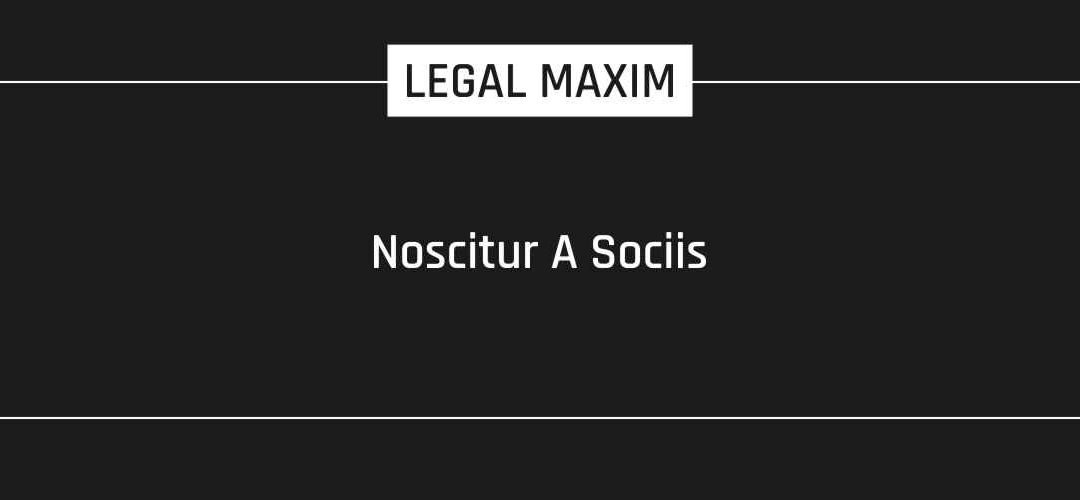Literal Meaning
The meaning of a word may be known from accompanying words
Origin
Latin
Explanation
The above principle is a rule of construction and is one of the rules of interpretation that is used by the courts to interpret the legislation. The translation of Noscitur a sociis is ‘the immediate context rule’ and underlines the importance of context in the statutory interpretation where two or more words are associated together, they should take their meaning from one another. This principle is also used in interpreting the questionable words in statutes when the word is ambiguous, so its meaning is derived with reference to the rest of the statute. This means that the meaning of an unclear word or phrase must be determined by the words that surround it. It can be said that the meaning of a word can be derived from the company it keeps. The questionable or doubtful meaning will derive a meaning when kept and determined from the associated words and is usually helpful when a statutory provision has a word or phrase that is capable of bearing two or more meanings.
The rule of interpretation is very well explained by Maxwell in his book of Interpretation of statutes in the following words- he states that when two or more words susceptible to analogous meaning are coupled together, they are to be used in their cognate sense. He comments that when the words take their color from and are quantified by each other, the meaning of the general words being restricted to the sense analogous to that of the less general. Thus, it can be comprehended that words in a list within a statue have meanings that are related to each other, and interpreting that word in an association of related words or phrases in a statute can help the court to interpret the exact meaning of the legislation. Therefore, this rule is more colloquially known as “birds of a feather flock together”.
Illustration
The eminent professor Graham illustrated the maxim with an example of the inability of an insured bankrupt to collect proceeds in the event of “illness, disability or death’. Bankruptcy means that there is a disability under the law since you cannot hold office and considered legally disabled. However, the rule of Noscitur a sociis says that in spite of this, no one can collect insurance since disability is associated or related by ‘illness’ and ‘death’. In this context, it is clear that the intention of the legislation is that ‘disability’ refers to the physical capacity as it is clear that this meaning can be determined in reference to the color of other words in this provision.
Case laws
in the case of Commissioner of Income Tax vs. Bharti cellular it was held that term ‘technical services’ used in section 194J of the Income Tax Act is unclear. The word technical would take colour from the words managerial & consultancy between which it is sandwiched. These terms ‘managerial services’ & ‘consultancy services’ necessarily involve human intervention. So, applying noscitur a sociis the word ‘technical’ would also have to be construed as involving a human element. Thus, interconnection & port access services rendered by the assessee do not involve any human interface & therefore cannot be regarded as technical services u/s 194J of the Income Tax Act.
In the case of Foster vs. Diphwys Casson, it was stated that a statute involved which stated that explosives taken into the mine must be in a “care or canister”. In the instant case, the defendant used a cloth bag and it was held that applying the principle of, the intention of the parliament was of using ‘care and container’ means using something of the strength of a container. Thus, it was held that the ‘bag’ does not fall under the statutory definition.
In the case of Parsons Brinckerhoff India (P) Ltd vs. Asstt. DIT (Int. Tax), applying the rule of noscitur a sociis held that the words “model” and “design” cannot fall under the definition of ‘royalty’ under explanation 2 of section 9 (I) (VI) of the Income Tax Act as they cannot relate or cannot be coupled with other words surrounding such as patent or invention or trademark.
This maxim has been written and submitted by Ms. Arushi Lamba during her course of internship at B&B Associates LLP. Ms. Arushi is a 4th-year law student of Panjab University, Chandigarh.

Thank you. I look forward to receiving more.